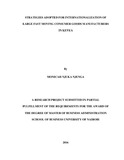| dc.contributor.author | Njenga, Monicah N | |
| dc.date.accessioned | 2016-12-23T07:12:54Z | |
| dc.date.available | 2016-12-23T07:12:54Z | |
| dc.date.issued | 2016 | |
| dc.identifier.uri | http://hdl.handle.net/11295/98408 | |
| dc.description.abstract | So as to thrive in the current dynamic market trends brought about by globalization, the organizations are necessitated to come up with appropriate strategies. Strategy enables a business attract and retain customers, ensures efficient utilization of resources as well as promoting business growth and expansion. For a firm to successfully internationalize its operations the right strategies have to be applied to ensure that the right market is chosen to suit the business objectives of a firm. This raises the need for evaluation of the strategies used during the internationalization process. The study was guided by the following research objectives: To establish the strategies adopted for internationalization of FMCG manufacturing firms in Kenya and to identify the challenges encountered in the internationalizing of large FMCG manufacturing firms in Kenya. The target respondents were top and middle level managers within the firms. Out of the 30 targeted firms, 22 responded while 8 did not respond representing a response rate of 73%. The primary data was mainly collected using questionnaires that were administered through drop and pick later method and through email. The analysis was conducted using descriptive measures such as frequencies, and percentages. The results revealed that 86% of the companies had undergone the internalization process while the remaining14% were yet to. This implied an increase in popularity of internationalization among the manufacturing companies. Exporting was found out to be the most used strategy adopted in internationalization. The study thus concludes that largest Fast Moving Consumer Goods Manufacturers in Kenya prefer the international market due to increase in demand in Kenya products and also cause of increased local competition. The study also concludes that stringent competition and various financial constraints are the major challenges that hinder full internationalization of the companies. The study recommends that the government should put in place measures to improve the internationalization process. Particularly, the government should reduce the number of bottle neck procedures undertaken during establishing an international market. The study also recommends that the government and policing agents should introduce incentives that make exporting attractive. This will encourage the companies to even export more goods, thus improving their performance. | en_US |
| dc.language.iso | en | en_US |
| dc.publisher | University of Nairobi | en_US |
| dc.rights | Attribution-NonCommercial-NoDerivs 3.0 United States | * |
| dc.rights.uri | http://creativecommons.org/licenses/by-nc-nd/3.0/us/ | * |
| dc.subject | Fast Moving Consumer Goods Manufacturers | en_US |
| dc.title | Strategies Adopted for Internationalization of Large Fast Moving Consumer Goods Manufacturers in Kenya | en_US |
| dc.type | Thesis | en_US |



